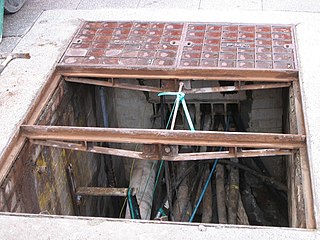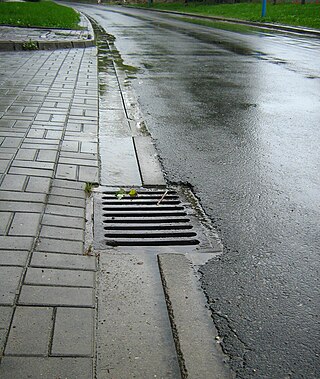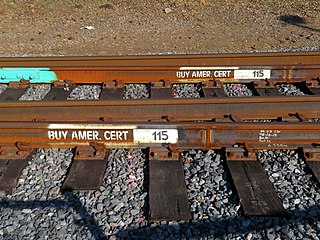
In metalworking and jewelry making, casting is a process in which a liquid metal is delivered into a mold that contains a negative impression of the intended shape. The metal is poured into the mold through a hollow channel called a sprue. The metal and mold are then cooled, and the metal part is extracted. Casting is most often used for making complex shapes that would be difficult or uneconomical to make by other methods.

A manhole cover or maintenance hole cover is a removable plate forming the lid over the opening of a manhole, an opening large enough for a person to pass through that is used as an access point for an underground vault or pipe. It is designed to prevent anyone or anything from falling in, and to keep out unauthorized persons and material.

A manhole is an opening to a confined space such as a shaft, utility vault, or large vessel. Manholes are often used as an access point for an underground public utility, allowing inspection, maintenance, and system upgrades. The majority of underground services have manholes, including water, sewers, telephone, electricity, storm drains, district heating, and gas.

A storm drain, storm sewer, surface water drain/sewer, or stormwater drain is infrastructure designed to drain excess rain and ground water from impervious surfaces such as paved streets, car parks, parking lots, footpaths, sidewalks, and roofs. Storm drains vary in design from small residential dry wells to large municipal systems.
A handbell is a bell designed to be rung by hand. To ring a handbell, a ringer grasps the bell by its slightly flexible handle – traditionally made of leather, but often now made of plastic – and moves the arm to make the hinged clapper strike the inside of the bell. An individual handbell can be used simply as a signal to catch people's attention or summon them together, but handbells are also often heard in tuned sets.

Sand casting, also known as sand molded casting, is a metal casting process characterized by using sand — known as casting sand — as the mold material. The term "sand casting" can also refer to an object produced via the sand casting process. Sand castings are produced in specialized factories called foundries. In 2003, over 60% of all metal castings were produced via sand casting.
Molding sand, also known as foundry sand, is a sand that when moistened and compressed or oiled or heated tends to pack well and hold its shape. It is used in the process of sand casting for preparing the mold cavity.

A porthole, sometimes called bull's-eye window or bull's-eye, is a generally circular window used on the hull of ships to admit light and air. Though the term is of maritime origin, it is also used to describe round windows on armored vehicles, aircraft, automobiles and even spacecraft.

A foundry is a factory that produces metal castings. Metals are cast into shapes by melting them into a liquid, pouring the metal into a mold, and removing the mold material after the metal has solidified as it cools. The most common metals processed are aluminum and cast iron. However, other metals, such as bronze, brass, steel, magnesium, and zinc, are also used to produce castings in foundries. In this process, parts of desired shapes and sizes can be formed.

In casting, a pattern is a replica of the object to be cast, used to form the sand mould cavity into which molten metal is poured during the casting process. Once the pattern has been used to form the sand mould cavity, the pattern is then removed, Molten metal is then poured into the sand mould cavity to produce the casting. The pattern is non consumable and can be reused to produce further sand moulds almost indefinitely.
Builders' hardware or just builders hardware is a group of metal hardware specifically used for protection, decoration, and convenience in buildings. Building products do not make any part of a building, rather they support them and make them work. It usually supports fixtures like windows, doors, and cabinets. Common examples include door handles, door hinges, deadbolts, latches, numerals, letter plates, switch plates, and door knockers.
The Standard Steel Casting Company, commonly referred to as Thurlow Works, was a steel production and steel casting facility founded in Chester, Pennsylvania in 1883 by shipbuilder John Roach. The company was established primarily to supply steel ingots for Roach's steel mills, which included the Chester Rolling Mill and the Combination Steel and Iron Company, although it also manufactured steel castings. Standard Steel was the first company in the United States to manufacture commercial quantities of steel utilizing the acid open hearth process.

EJ Group, formerly East Jordan Iron Works, is an American manufacturer of iron products, headquartered in East Jordan, Michigan. The company manufactures and distributes iron construction castings, fabricated products, composite products, water distribution solutions, and other infrastructure access products for water, sewer, drainage, telecommunications, and utility networks worldwide.

The Commonwealth Steel Company was an American steel company based in Granite City, Illinois, founded in 1901 "by some of the young men who had helped establish the American Steel Foundry". The company produced steel castings and railroad supplies at its 10-acre (4-hectare) plant, employing about 1,500 people.

Bremen Castings, Inc (BCI) is a 4th generation family owned manufacturer of machined complete gray & ductile iron castings for heavy truck, valves & pipe fittings, pump components, compressors, lawn/garden equipment, and military contract work. BCI is headquartered in Bremen, Indiana.
Reliance Foundry Co. Ltd. is a private company based in Vancouver, Canada. The company was founded in 1925, and constitutes one of Canada’s oldest metal casting supplier firms.

Neenah Foundry is a manufacturing company in the north central United States, based in Neenah, Wisconsin. The company manufactures cast iron manhole covers, gratings, and similar items for municipal and construction applications. Neenah Enterprises, Inc. manufactures iron castings for the heavy truck, agriculture, construction, and related markets.

Section 165 of the Surface Transportation Assistance Act of 1982 is a section of the larger STAA that deals with purchases related to rail or road transportation. Unlike the similarly titled Buy American Act (1933), the Buy America Act applies only to purchases related to rail or road transportation, such as the construction of highways, railways, or rapid transit systems. The 1982 provisions also apply to purchases made by third-party agencies, using funds granted by agencies within the United States Department of Transportation.
Midland-Ross Co. was an American steel, aerospace products, electronics, and automobile components manufacturer which existed from 1894 to 1986.

Birdsboro Steel was an American producer of steel, machines, and machine parts based in Birdsboro, Pennsylvania. The company also produced munitions, tanks, and artillery in the late 1940s through their subsidiary company, Armorcast. Though the company wasn't officially established until around 1867, the roots of the company go as far back as 1740















